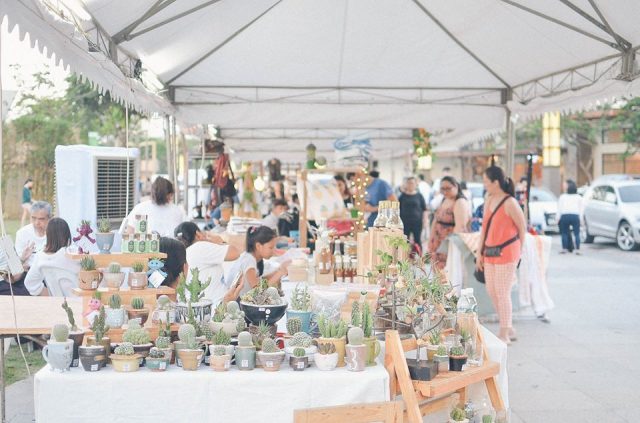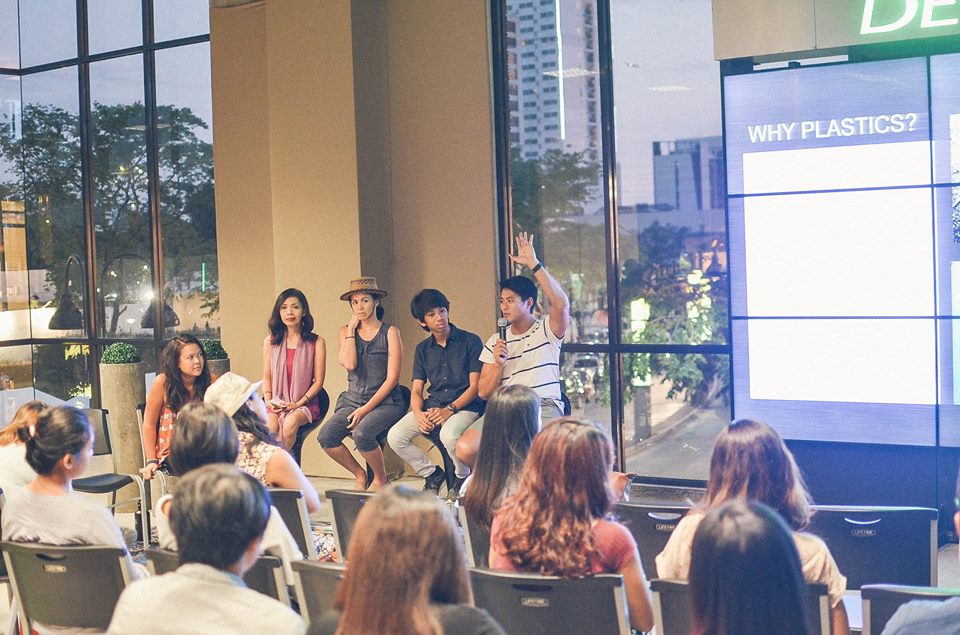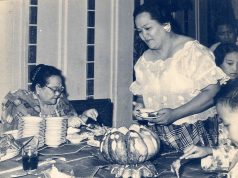
MUNI Market stands out among other weekend markets being mounted around the metro for its strong initiative in being an avenue for selling healthy, local, and eco-friendly products.
But more than being a market, MUNI enriches the experience of its market-goers through different activities including learning events like MUNI meet ups.
At its latest event held in April, MUNI Market particularly highlighted conversations on sustainability, zero-waste living, and responsible travelling among many others.
The writer was able to sit down and listen to two meetups: Responsible Travel and Zero Waste Living.
The talk on “Responsible Travel” highlighted how wanderlusts can enjoy exploring places without harming the environment and communities. Speakers were Tin Mansinares, Provincial Tourism Officer of Negros Occidental; Gela Petines, CEO of Reef Nomads; and Guido Sarreal, co-founder of Kawil Tours.
Another talk included the discussion on practicing zero-waste living as led by speakers Bea Misa Crisostomo, co-founder of Ritual; Ziggie Gonzales, proponent of The Plastic Solution; Levin Frias of The E-Waste Project; and Victoria Martires Cabo-Chan, Trustee / VP for Youth and Academe, Zero Waste Recycling Movement of the Philippines Inc.
The talks focused on waste management and how various groups are now involved in implementing sustainable solutions.
According to Benitez of Reef Nomads, a group that aims to reconnect people to the ocean through guided skin diving tours: “Every single piece of straw you’ve ever used in your life will still exist; and every piece of plastic you’ve ever used, and will use will outlive you.”
Benitez observed that when she dives, she still sees massive amounts of trash that continue to pollute the waters.
Gonzales, a surfer, and one of the proponents of Plastic Solutions—a movement that tries to address the threat of loose plastics or loose trash—shared.”The Philippines is No. 3 in the world in plastic pollution. Top pollutants in the Philippines are food wrappers, cigarette butts, and so on,”

Although these environmental problems continue to persist, the speakers underscored that every single one of us can contribute in problem solving.
“Try to reduce the use of plastic. And if you put through that you’re going to save lives. Let’s not try to replace marine life in the ocean with plastics,” Benitez encouraged.
Frias of The E-Waste Project, a campaign to raise awareness on the proper disposal of electronic waste, also said, “Kahit sino sa atin, may mga maliit na bagay tayong magagawa na merong significant impact sa environment. Naniniwala kasi kami na a cleaner, a healthier, and a more sustainable lifestyle contributes to nation building kaya we encourage everyone to take a first step into a zero-waste lifestyle/living. Gawin natin siya para sa next generation, gawin natin siya for the environment, gawin natin siya para sa bayan, para sa mundo,”
Meanwhile, here are some tips on how to be a responsible traveler:
1. Allow yourself to be inconvenienced.
Sarreal of Kawil tours, an advocate of responsible travel in the Philippines, said that traveling is a privilege, and therefore comes with responsibility.
During travels, he advised, “If you want to contribute, if you want to lessen your damage, allow yourself to be inconvenienced.”
One of those ways to limit your damage to the environment is by using regular tissue over wet wipes since the latter are known to contain non-biodegradable materials.
2. Pick up trash.
Whether during dives or mountain climbing, try to pick up trash that you see.
3. Leave no trace.
As advised by Benitez, try to leave the place as beautiful as you’ve found it or even better.
4. Listen and speak with love.
“When you travel,try to ask questions with your co-travelers or locals, and try to get to know the place more, and then, speak with love. ‘Pag may nakita kang nagtapon, try to speak with love,” Benitez said.
Moreover, Benitez also suggested to be more receptive both to the good and bad stories of the places you travel to.
5. Be compassionate.
Benitez advised not to see what you are experiencing with an eyes of a tourist because it’s quite impersonal. Instead, try to be compassionate.
“The way you want to be treated is basically the way you treat everything,” she said.
On the other hand, here are some tips on how you can jump start your zero waste living:
1. Avoid using straws.
Benitez suggests that when buying in milk tea or coffee shops, you can ask them to serve it in a mug. If your drink is for take out, use your own tumbler, and if you really want to use straws, you could opt to use metal straws.
2. Segregate.
According to Gonzales, you will start to realize how much trash you produce when you start to segregate.
“Take action. Step one is to segregate. That’s when you realize your massive impact to the environment. Segregate non-biodegradable trash from your composting, and your recyclables; and you’ll see how much you’ll end up with. If you learn to segregate, you’ll learn how much your consumption is in a month,” he said.
3. Take part in the Plastic Solution movement.
According to Gonzales, in Plastic Solutions, they stuff and fill plastic bottles with loose plastics such as candy wrappers, and in turn make it into “eco bricks,” which they use to build homes of their partner communities.
“One 1.5 bottle can compact 500 to 600 grams of loose trash. That’s a lot. Loose plastics are the biggest problems. Hard plastics can be recycled to a point but loose plastics, those usually end up in the wild,” Gonzales shared.
You can then drop your stuffed bottles to designated drop off areas, which are indicated in their website.
3. Be responsible for your e-wastes.
E-waste refers to any discarded technical or electronic devices. According to Frias of the E-Waste Project, there are harmful substances on our electronic wastes that can get to our landfills or ground water, which can cause environmental and health concerns.
“Try to dispose your e-wastes to proper recycling centers,” he encouraged.
4. Be a conscious consumer when it comes to buying electronic gadgets.
Frias also advised not to buy gadgets that you do not need.
“Ito yung pinakabasic na magagagawa natin on a personal level. ‘Yung importante, nagreresearch tayo tungkol sa bibilhin natin. Kailangan malaman natin yung lifespan nya, capabilities nya, sapat ba yun for our needs kasi minsan bumibili tayo ng overkill. ‘Di naman natin kailangan, binibili natin kahit na meron tayong device na kaya pa yung kailangan natin, bibili tayo dahil lang merong bago,” he said.
5. Take inspiration from nature.
Crisostomo of Ritual, a plastic bag-free sustainable general store located in Makati shared that “the concept of garbage is a modern human phenomenon,” and that we should “look beyond this period which everything is in plastic.”
“Nature has no waste. Everything gets cycled back. Everything becomes life again..In nature everything is useful, and up until around 30’s, everything that we use can be cycled back to nature,” she shared.
In her store, they use glasses as containers for their products because glass are infinitely reusable and recyclable.
6. Regain our lost commons.
Crisostomo also expressed her hope to bring back areas called “commons.”
“We’ve lost our commons. These are usually areas that nobody owns, and where people grow things like bamboo, fiber plants, etc. We’ve lost our commons because for us, it’s not important anymore..Why don’t we plant trees that actually nourish the soil and create oxygen? Let’s radically aim for these,” she said.
She also mentioned that some of fiber plants like buri can be used to make containers, which are sustainable than using plastic packaging.









